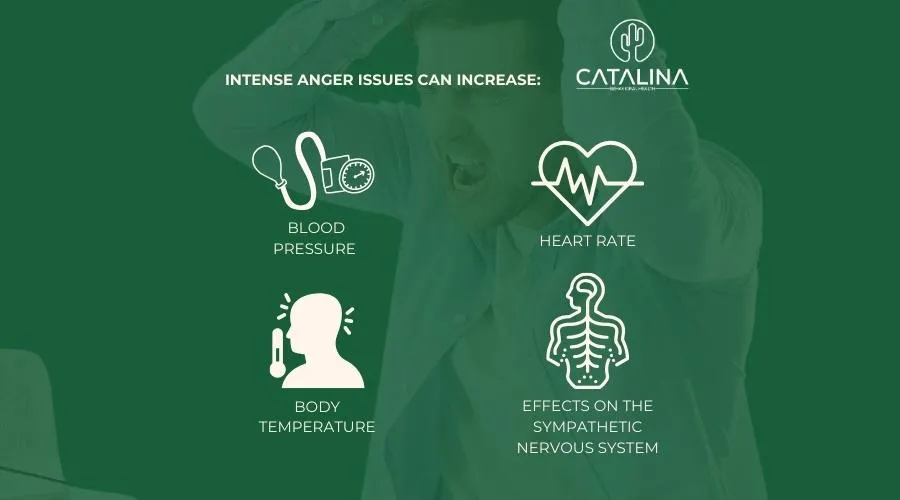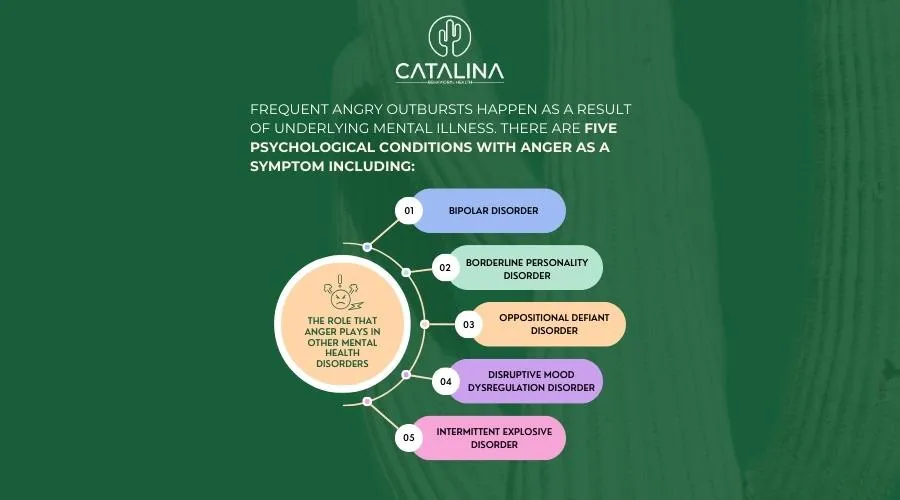Getting Evidence-Based Help for Anger Issues at Catalina
Many people feel angry. Anger is a normal reaction, especially when a person feels wronged or that something is unfair. For people who have angry outbursts or difficulty handling angry emotions healthily, however, anger is much more than that. You may already be familiar with how disruptive and harmful excess anger can be, whether in your own experience or in seeing how it affects a loved one.
Angry outbursts can damage relationships, cause problems at work, and even harm physical health. Rage is a strong emotion and for individuals struggling to handle it, anger management rehab can help.
While Catalina Behavioral Health is a Joint Commission-accredited addiction recovery center, we also offer services to mental-health-only clients like individuals struggling with intense emotions like anger. This includes a variety of inpatient and outpatient services that can be used to tailor a program to your specific needs, or those of a loved one who would like support for anger issues.
Keep reading and we’ll look more deeply into what causes anger, inpatient and outpatient options for anger management, and the effective therapies that we use for anger management rehab at Catalina!
Get Effective Anger Treatment Options – Reach Out Now!
Can I Attend Rehab for Anger Management?
Yes, you can attend rehab for anger management. However, it’s worth noting that not all rehabs are the same. Some rehabs only offer alcohol and drug addiction recovery services. Others do have mental health services but only provide them for addiction clients.
At our treatment facility, we offer rehab for alcohol and drug abuse, as well as services for patients struggling with behavioral or mental health disorders. While substance abuse treatment and mental health services at Catalina can be used as part of a dual diagnosis program, we also offer services that focus solely on anger management. This ensures your treatment is focused on the services that you need most, efficient and effective treatment.
How to Know if I Have Anger Management Issues

Everyone feels angry sometimes. It’s a very normal reaction when things are outside of our control and we feel helpless, powerless, or wronged. For some people though, angry emotions take control. Even small things might cause someone to react by yelling and becoming aggressive. Some signs and symptoms that you may be struggling with anger include:
- Reacting quickly and angrily to a situation that doesn’t call for it, like someone accidentally bumping into you
- Throwing or breaking things when experiencing negative emotions like anger
- Punching walls, furniture, or other objects
- Becoming so angry that you experience physical symptoms like sweating, headaches, and heart palpitations
- Having the same arguments at work or in relationships
- Verbally or physically hurting others
- Struggling with emotional regulation and calming yourself
- Isolating or self-harming when angry
- Taking feedback personally and difficulties accepting feedback
- Making accusations of friends and family
There are psychological questionnaires that can help determine the extent of a person’s anger and how it impacts their life. However, many people experience a decline in their mental and physical well-being and experience negative consequences that make it clear anger issues are disrupting their lives.
Understanding Where Anger Comes from

Angry emotions can be triggered by several things, including internal and external events. Being cut off in traffic or disagreeing with a coworker may cause anger. Anger issues may be caused by remembering a traumatic event or internal thoughts about something.
There are also cases where a person explodes or becomes irrationally angry without any cause. Conditions like intermittent explosive disorder can cause sudden bursts of anger for no apparent reason. Anger is something that happens on a spectrum. Some people become mildly irritated by certain circumstances, while others experience uncontrollable rage.
Childhood Violence and Later Anger Issues
Sometimes, witnessing anger during childhood also increases the risk of anger issues later in life. Children who have witnessed violence between parents are also at greater risk of social withdrawal, difficulties in school, bullying or fighting, rebellious behavior, substance abuse, low self-esteem, anxiety, and depression.
Anger Management and Substance Abuse
Individuals struggling to manage angry emotions may turn to substance use including alcohol, marijuana, and other drugs to cope. They may do this to relax, escape reality or their situation, or cope with the negative outcomes of emotional outbursts.
Unfortunately, substance use can make a person’s impulse control worse, making them more likely to react negatively if they become angry while intoxicated. A person may also start to rely on alcohol or other substances too much, leading to addiction.
For individuals struggling with anger issues and substance use disorder, Catalina also offers dual diagnosis services. Dual diagnosis focuses on drug and alcohol addiction in addition to treatment for behavioral or mental health disorders.
Confidentia Assessment for Anger Issues – Reach Out Now!
The Role that Anger Plays in Other Mental Health Disorders

Experiencing negative feelings like anger all the time can be draining. Individuals with anger issues may not know why they act the way that they do. They may also struggle to feel like they can control themselves when angry, no matter how much it impacts their life.
Furthermore, negative consequences at work, home, and in personal relationships can contribute to feelings of isolation or sadness. Some people with anger experience symptoms like depression or anxiety in addition to anger. They may feel depressed because they feel powerless and out of control or anxious about something upsetting them and causing a reaction.
Sometimes, frequent angry outbursts happen as a result of underlying mental illness. There are five psychological conditions with anger as a symptom including:
- Bipolar disorder
- Borderline personality disorder
- Oppositional defiant disorder
- Disruptive mood dysregulation disorder
- Intermittent explosive disorder
Angry outbursts can also happen when a person feels threatened or overwhelmed. Conditions like anxiety, post-traumatic stress disorder, depression, schizophrenia, and other mental health conditions can cause outbursts like this, too.
Anger and Your Physical Health
Frequent feelings of anger take a toll on the body, too. Intense anger issues can increase heart rate, raise body temperature, and have other effects on the sympathetic nervous system. In some individuals, this can even raise blood pressure and leave them at greater risk for stroke.
Among the treatment options for high blood pressure and physical symptoms of options is learning to manage anger. This might involve talk therapy, support groups, and learning healthy ways to cope.
Evidence-Based Treatment for Anger

While feeling anger is normal, anger issues that result in fits of rage are unproductive. When you experience this anger frequently or in the wrong environment, it can be dangerous. Intense anger can harm relationships, cause problems at work, and in cases of road rage, even become deadly. With so much at stake, it’s important to find an anger management treatment program that works.
Both outpatient and residential treatment programs for mental health are excellent options for treating anger issues. During talk therapy for anger management, you’ll be invited to look at the source of anger issues. However, this is only the beginning. You typically cannot change the things around you, so it’s important to change how you respond to the anger instead.
By using cognitive behavioral therapy for anger management, learning tactics for remaining calm, and exploring other therapy options when they are applicable, you will take control of anger instead of allowing anger issues to control you. This might involve calming strategies to get you through moments of anger, strategies to redirect that anger, and then learning to communicate that anger in a way that is assertive instead of aggressive.
Can Anger Be Treated with Medication?
Even though there are no drugs designed to target anger specifically, certain medications have shown effectiveness in managing anger and outbursts. SSRIs are usually used to treat depression and anxiety, but they are also sometimes prescribed for anxiety. Benzodiazepines are another option, though these are most likely to be used in the short term.
Additionally, some individuals have anger as a result of an underlying condition. For example, individuals with bipolar disorder or disruptive mood dysregulation disorder may be prescribed antipsychotics to help improve mood and reduce angry outbursts.
What Happens During Anger Management Treatments?
Often, anger management starts by attending individual counseling or working with a psychiatrist to help understand why you feel so angry. For individuals struggling with angry outbursts, it may seem like they come on suddenly and are impossible to control. In these situations, it’s likely there is an underlying issue like unrepressed trauma, an untreated mental health disorder, or other problems that contribute to angry outbursts.
Attending treatment at Catalina Behavioral Health gives our clients a safe place to learn tools for managing angry feelings and focusing on healing. An inpatient program works well for individuals with severe anger issues who may need around-the-clock care until they learn coping skills that work. Intensive outpatient and partial hospitalization programs are more intense than therapy but still allow you to go to work during the day.
Whether you choose inpatient treatment, intensive outpatient therapy, partial hospitalization programs, or other outpatient options, you’ll have the necessary support in place to overcome anger and learn healthy ways to communicate frustration.
Group and Family Therapy

In addition to individual treatment, those in anger management often have group sessions with licensed professional counselors and a group of their peers. Group therapy allows program participants to share stories, develop social and communication skills, discuss how angry feelings have impacted their lives, and learn tools for coping with anger in a supportive environment.
Other people may benefit from working with a therapist during family therapy sessions. While it is believed that genetics contribute to how “hotheaded” a person is, there is also evidence that family upbringing plays a role. In addition to addressing these issues, it can help foster a sense of connection between family members whose relationships may have been damaged by conflict.
Learning to Handle Intense Anger
When rage comes on, individuals can express it, suppress it, or make efforts to calm it. Expressing anger is okay when it is done in an assertive manner rather than an aggressive one. For individuals struggling with strong negative emotions like rage, however, it might be more productive to suppress strong feelings in the moment. Then, they can redirect it or when it is justified, express anger in a healthy, productive way.
Practicing relaxation techniques when you are not angry makes it easier to implement them when you are experiencing intense anger. Some helpful calming techniques include deep breathing, progressive muscle relaxation, counting, repeating a calming word, using imagery or visualization, and non-strenuous activities like yoga.
How Long Does it Take for Anger Management Therapy to Work?
You can indeed make some progress with anger management therapy after just a few sessions. You will learn effective tools that make it easier to deal with angry outbursts. Some people learn what they need from individual and group therapy after just a few months.
For individuals struggling with a mental health disorder that causes anger, it may take a little longer to do all the work. The underlying problem needs addressed and treated for recovery. It’s important to remember that anger management is something you’ll need to continually work toward.
While a therapist can give you the tools to overcome anger, it is ultimately up to you to make the necessary lifestyle changes and use them in your life.
Using Insurance Coverage to Pay for Anger Management Rehab

Many people wonder if their insurance provider will cover rehab for anger management. Intense angry feelings are considered a behavioral or mental health condition. Services for mental and behavioral health are considered an essential health benefit that both public and private insurers must offer some type of coverage for.
How to Find Out if Your Provider Covers Anger Management
At Catalina, we understand how frustrating it can be to try and find out if your insurance covers services at a rehab facility. We can quickly and easily verify coverage– just give us a confidential call now!
Catalina Behavioral Health accepts AHCCCS from Arizona residents with Medicaid and works with many private insurers. Some of our clients find that anger management services are fully covered under their plan, while others have small out-of-pocket expenses. It varies depending on your provider’s coverage and the specific services that make up your individualized treatment plan.
Up To 100% of Rehab Costs Covered By Insurance
Get Proven Support for Anger Management at Catalina
The caring staff at Catalina understands the negative impact rage can have on your life and that of your loved ones. Being angry puts you at risk for conflict at work and employment issues. It also wreaks havoc on personal relationships, making it hard to maintain friend, family, and romantic relationships.
Long-term recovery from anger is possible. Reach out to our facility to learn more about treatment options today that will improve your sense of well-being today. Whether you are seeking anger management treatment alone or treatment for co-occurring substance abuse, we can help you come up with an effective treatment plan that will make you feel healthier and in control again!







